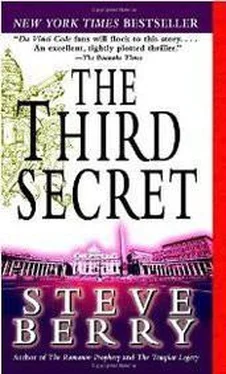He thought about calling for help or administering CPR. He’d been trained, as had all the household staff, but he knew it would be useless.
Clement XV was dead.
He closed his eyes and said a prayer, a wave of grief sweeping through him. It was like losing his mother and father all over again. He prayed for his dear friend’s soul, then gathered his emotions. There were things to do. Protocol that must be adhered to. Procedures of long standing, and it was his duty to ensure that they were strictly maintained.
But something caught his attention.
Resting on the nightstand was a small caramel-colored bottle. Several months back, the papal physician had prescribed medication to help Clement rest. Michener himself had ensured that the prescription was filled, and he’d personally placed the bottle in the pope’s bathroom. There were thirty of the tablets and, at last count, which Michener had taken only a few days ago, thirty remained. Clement despised drugs. It was a battle to simply get him to take an aspirin, so the vial, here, beside the bed, was surprising.
He peered inside the container.
Empty.
A glass of water resting beside the vial contained only a few drops.
The implications were so profound that he felt a need to cross himself.
He stared at Jakob Volkner and wondered about his dear friend’s soul. If there was a place called heaven, with all his fiber he hoped the old German had found his way there. The priest inside him wanted to forgive what had apparently been done, but now only God, if He did exist, could do that.
Popes had been clubbed to death, strangled, poisoned, suffocated, starved, and murdered by outraged husbands.
But never had one taken his own life.
Until now.

THIRTY
9:00 A.M.
Michener watched from the bedroom window as the Vatican helicopter touched down. He hadn’t left Clement since his discovery, using the phone beside the bed to telephone Cardinal Ngovi in Rome.
The African was the camerlengo, chamberlain of the Holy Roman Church, the first person to be informed of a papal death. Under canon law Ngovi was charged with administering the Church during the sede vacante, the Vacant See, which was now the official designation for the Vatican government. There was no supreme pontiff. Instead Ngovi, in conjunction with the Sacred College of Cardinals, would administer a government by committee that would last for the next two weeks, during which time funeral preparations would be made and the coming conclave organized. As camerlengo, Ngovi would not be acting pope, just a caretaker, but his authority was nonetheless clear. Which was fine by Michener. Somebody was going to have to control Alberto Valendrea.
The chopper blades whirled down and the cabin door slid open. Ngovi exited first, followed by Valendrea, both dressed in scarlet regalia. As secretary of state, Valendrea’s presence was required. Two more bishops followed Valendrea, along with the papal physician, whom Michener had specifically requested. He’d told Ngovi nothing of the details surrounding the death. Nor had he told the villa staff, merely informing the nun and chamberlain to make sure no one entered the bedroom.
Three minutes passed before the bedchamber door swung open and the two cardinals and physician entered. Ngovi closed the door and secured the latch. The doctor moved toward the bed and examined Clement. Michener had left everything exactly as he found it, including Clement’s laptop computer, still on, connected to a phone line, its monitor bright with a screen saver programmed specially for Clement—a tiara crossed by two keys.
“Tell me what happened,” Ngovi said, laying a small black satchel on the bed.
Michener explained what he’d found, then motioned to the table. Neither of the cardinals had noticed the pill vial. “It’s empty.”
“Are you saying the supreme pontiff of the Roman Catholic Church killed himself?” Valendrea asked.
He wasn’t in the mood. “I’m not saying anything. Only that there were thirty pills in that container.”
Valendrea turned toward the doctor. “What’s your assessment, Doctor?”
“He’s been dead for some time. Five or six hours, maybe longer. There’s no evidence of trauma, nothing to outwardly indicate cardiac arrest. No blood loss or bruising. From a first look, it appears he died in his sleep.”
“Could it have been from the pills?” Ngovi asked.
“There’s no way to tell, except through an autopsy.”
“That’s out of the question,” Valendrea immediately said.
Michener faced the secretary of state. “We need to know.”
“We don’t need to know anything.” Valendrea’s voice rose. “In fact, it’s better we know nothing. Destroy that pill vial. Can you imagine the impact on the Church if it became known that the pope took his own life? The mere suggestion could cause irrevocable harm.”
Michener had already considered the same thing, but he was determined to handle the situation better than when John Paul I had died suddenly in 1978, only thirty-three days into his pontificate. The subsequent rumors and misleading information—designed simply to shield the fact that a nun had discovered the body instead of a priest—only fueled conspiratorialists with visions of a papal murder.
“I agree,” Michener conceded. “A suicide cannot be publicly known. But we should know the truth.”
“So that we can lie?” Valendrea asked. “This way we know nothing.”
Interesting Valendrea was concerned about lying, but Michener kept silent.
Ngovi faced the doctor. “Would a blood sample suffice?”
The physician nodded.
“Take it.”
“You have no authority,” Valendrea boomed. “That would need a consultation with the Sacred College. You are not pope.”
Ngovi’s features remained expressionless. “I for one want to know how this man died. His immortal soul is of concern to me.” Ngovi faced the doctor. “Run the test yourself, then destroy the sample. Tell the results only to me. Clear?”
The man nodded.
“You’re overstepping, Ngovi,” Valendrea said.
“Take it up with the Sacred College.”
Valendrea’s dilemma was amusing. He couldn’t overrule Ngovi nor, for obvious reasons, could he take the matter to the cardinals. So the Tuscan wisely kept his mouth shut. Maybe, Michener feared, he was simply giving Ngovi enough rope to hang himself.
Ngovi opened the black case he’d brought with him and removed a silver hammer, then stepped to the head of the bed. Michener realized the ritual about to be performed was required of the camerlengo, no matter how useless the task may be.
Ngovi lightly tapped Clement’s forehead with the hammer and asked the question that had been posed to the corpses of popes for centuries. “Jakob Volkner. Are you dead?”
A full minute of silence passed, then Ngovi asked the question again. After another minute of silence, he asked a third time.
Ngovi then made the required declaration. “The pope is dead.”
Ngovi reached down and lifted Clement’s right hand. The Fisherman’s Ring wrapped the fourth finger.
“Strange,” Ngovi said. “Clement did not usually wear this.”
Michener knew that to be true. The cumbersome gold ring was more a signet than a piece of jewelry. It depicted St. Peter the fisherman, encircled by Clement’s name and date of investiture. It had been placed on Clement’s finger after the last conclave by the then-camerlengo and was used to seal papal briefs. Rarely was it worn, and Clement particularly shunned it.
“Maybe he knew we would be looking for it,” Valendrea said.
Читать дальше













